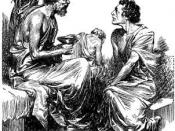Socrates and Polemarchus argue the idea of Dikaisune in the beginning of Plato's book, The Republic. Dikaisune translated into English means justice. Justice is one of the four virtues in the group with courage, self-control, and wisdom, which are proposed as being sufficient to live a moral life. Polemarchus considers justice to be the only virtue necessary to live a moral life. Polemarchus adapts the idea of Simonides' concept of Dikaisune, and argues with Socrates that Dikaisune is sufficient to live a moral life. Socrates disagrees if only for the sake of argument. While Polemarchus might have had a great idea by thinking that the idea of Dikaisune is enough to live morally, in reality, justice alone is not sufficient to live a moral life.
Simonides does not create the idea of Dikaisune. Before it was a moral idea, it was a Greek word meaning justice. Polemarchus agrees with Simonides. Simonides believes that justice is the only virtue needed to live a moral life. To this end, he thinks that when justice is honored in the correct manner that a person is essentially paying their debts. A debt is defined as owing a favor to a friend or harm to an enemy. While Polemarchus agrees with Simonides, Socrates unfortunately decides that he will argue the idea of Dikaisune. But in the end, it was really Simonides' ideas that Socrates was debating and in actuality, Socrates put Simonides to shame not Polemarchus.
Polemarchus' main flaw with his argument is that he defines morality with justice only. Polemarchus believes that Dikaisune, giving people what you owe them, is the truth behind morality. Justice succinctly means giving people what you owe them. The word "you" can be substituted with many other words such as government, judge, friend,


